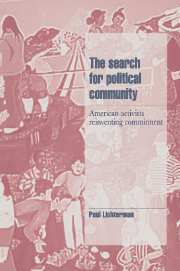Book contents
- Frontmatter
- Contents
- Acknowledgments
- 1 Personalism and political commitment
- 2 Personalized politics: the case of the US Greens
- 3 Speaking out in suburbia
- 4 Imagining community, organizing community
- 5 Culture, class, and life-ways of activism
- 6 Personalized politics and cultural radicalism since the 1960s
- 7 The search for political community
- Appendix I Choosing and studying the organizations
- Appendix II Why participant-observation was necessary
- Notes
- References
- Index
1 - Personalism and political commitment
Published online by Cambridge University Press: 23 January 2010
- Frontmatter
- Contents
- Acknowledgments
- 1 Personalism and political commitment
- 2 Personalized politics: the case of the US Greens
- 3 Speaking out in suburbia
- 4 Imagining community, organizing community
- 5 Culture, class, and life-ways of activism
- 6 Personalized politics and cultural radicalism since the 1960s
- 7 The search for political community
- Appendix I Choosing and studying the organizations
- Appendix II Why participant-observation was necessary
- Notes
- References
- Index
Summary
A COMMON COMPLAINT
Critics often say that too few Americans get politically involved. Active political commitment is declining, goes one familiar complaint, because people have become too concerned with their own personal fulfillment. Critics fear that the widespread emphasis on self-fulfillment is destroying traditional community ties that are necessary for active citizenship and the sacrifices that may accompany it. Calls to reestablish “a sense of community” continue to resound in academic criticism, political leaders' rhetoric, and everyday talk about what is wrong with contemporary US culture.
This book addresses the complaint about self-fulfillment and political commitment by exploring how different environmental activists practice their commitments to activism. Critics of the self-fulfillment ethos would not question that people can and do enter the political arena to win attention for their personal needs. The question is whether the self-fulfillment ethos necessarily detracts from a public-spirited politics, a politics that aims to secure a common, public good such as a safer environment for a wide community of citizens. Critics of modern US culture have often assumed that it takes certain kinds of communal bonds between people to nurture public-spirited commitments: they have advocated the kinds of ties that Americans in the past developed in local or perhaps national communities with shared civic or religious traditions that obligated community members to one another. People who grow up within such ties would find it easier, more natural to commit themselves to the public good than those who don't. These critics argue that the self-fulfillment ethos has weakened these communal ties.
- Type
- Chapter
- Information
- The Search for Political CommunityAmerican Activists Reinventing Commitment, pp. 1 - 29Publisher: Cambridge University PressPrint publication year: 1996

